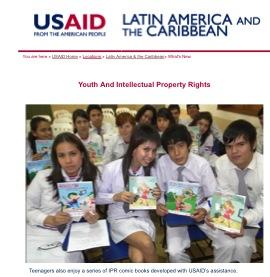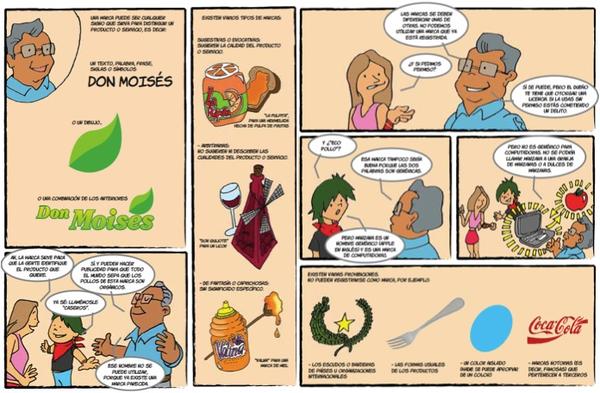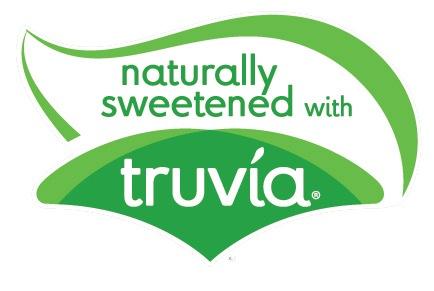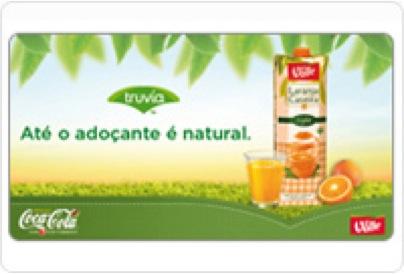I wrote last week about the pharmaceutical industry’s aggressive promotion of Intellectual Property Rights as part of U.S. government negotiated “free trade” agreements. This blog is a comic update. USAID
USAID
The United States Agency for International Development (USAID) website currently features a story on its Latin America and the Caribbean page: “Youth and Intellectual Property Rights” (IPR).
This USAID youth outreach initiative, according to its sponsors “is reaching 6,000 students this year to educate them on the need to respect IPR. USAID is also working to establish IPR as a permanent academic subject in schools through an agreement among the Ministry of Industry and Commerce, the Ministry of Education and USAID.”
As part of this youth-oriented “educational” initiative, the comic book Enselmita y Augustin (featured in the photo), teaches the value of IPR to Paraguayan youth.
The protagonists, a young brother and sister pair, have developed a new all-natural chicken feed (I’m not kidding) and turn to the wisdom of the elder Don Arturo. He explains to them that they need a brand name, and proceeds to illuminate the market principles of patenting and trademark.
 Programa Umbral (www.programaumbral.gov.py)
Programa Umbral (www.programaumbral.gov.py)
Don Arturo explains the need to avoid intellectual property theft; generic terms are out of range, unless you are being witty like the U.S. corporation Apple, Inc. Moreover, it is forbidden to register a trademark for a flag, for a common item like a spoon, an isolated color like blue, or, of course, a well-established trademark like Coca-Cola.
The mention of Coca-Cola hints at another more tragic story, lurking beneath this propaganda. The secret ingredient to Enselmita y Augustin’s successful chicken feed is hailed in the comic book as an organic form of nutrition derived from the ka`a he`e, also known as stevia. Stevia is a plant native to South and Central America, where it has been consumed in the region for centuries as medicine and as a sweetener in teas. The comic suggests our young heroes might tap into their indigenous roots and capitalize through a healthy entrepreneurial endeavor.
Since the late 1990s, stevia has been banned from the U.S. market after an anonymous tip to the Food and Drug Administration questioning its safety (one story is that someone in the artificial sweetener industry was threatened by the potential competition.)  www.truvia.comIt turns out, chemists working for the Coca-Cola Company in collaboration with the Cargill Corporation have derived from the stevia plant a form of “all natural” sweetener, with zero calories, that corporate executives hope will be a golden bullet to replace low-calorie artificial sweeteners on the market. They call it “Truvia.” The Coca-Cola Company website brags that Truvia is already used in more than 20 products sold by the corporation worldwide, and gleefully anticipates “that by 2012 there will be a substitution of 40 percent of consumption of Stevia in relation to sugar in the world.” It seems Enselmita and Augustin were beaten to the punch.
www.truvia.comIt turns out, chemists working for the Coca-Cola Company in collaboration with the Cargill Corporation have derived from the stevia plant a form of “all natural” sweetener, with zero calories, that corporate executives hope will be a golden bullet to replace low-calorie artificial sweeteners on the market. They call it “Truvia.” The Coca-Cola Company website brags that Truvia is already used in more than 20 products sold by the corporation worldwide, and gleefully anticipates “that by 2012 there will be a substitution of 40 percent of consumption of Stevia in relation to sugar in the world.” It seems Enselmita and Augustin were beaten to the punch.
The story gets even stranger.
The Coca-Cola product has more than one controversial additivethe most famous being extracts of the coca leaf. Apparently, stevia is another beverage additive the company utilizes that doubles as a medicine and circulates in the market as a drug, or in other terms, much like the coca leaf, as a controlled substance. The company itself happily explains the FDA has not approved stevia as a food ingredient, but it has issued a statement of “no-objection” to Coca-Cola’s marketing of its derivative. Like coca, as long as the raw plant material stevia is transformed in U.S. chemical laboratories (and trademarked “Truvia”), it becomes safe (and profitable) for consumption. Otherwise, in its raw form, it (www.truvia.com) is excluded from the legitimate market.
(www.truvia.com) is excluded from the legitimate market.
Keeping all this in mind makes Coca-Cola’s marketing pitch for its newly release truvia-flavored beverage in Brazil seem most suited to a scene from Huxley’s A Brave New World:
The new Del Valle Laranja Caseira Light formula was developed at the Research and Development Laboratory at Coca-Cola Brasil in partnership with Cargill, after a broad and rigorous program of scientific research into the properties of Stevia
Truvia® natural sweetener is refreshingly uncomplicated. Sprinkle it on your grapefruit. Spoon it in your coffee. It won’t end up on your conscience or your thighs.
Refreshingly uncomplicated.

